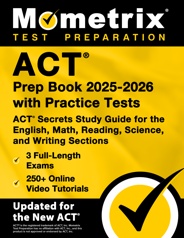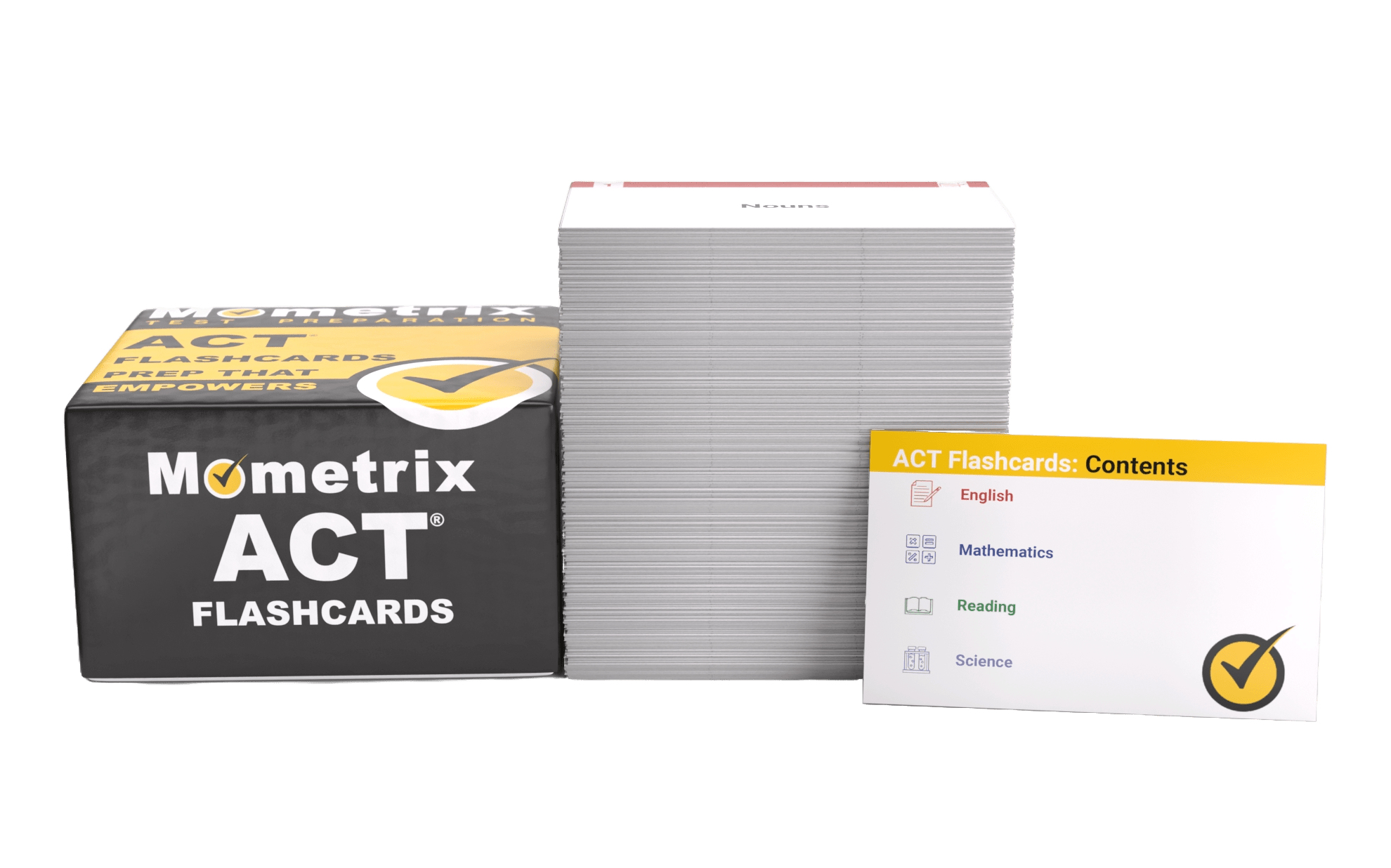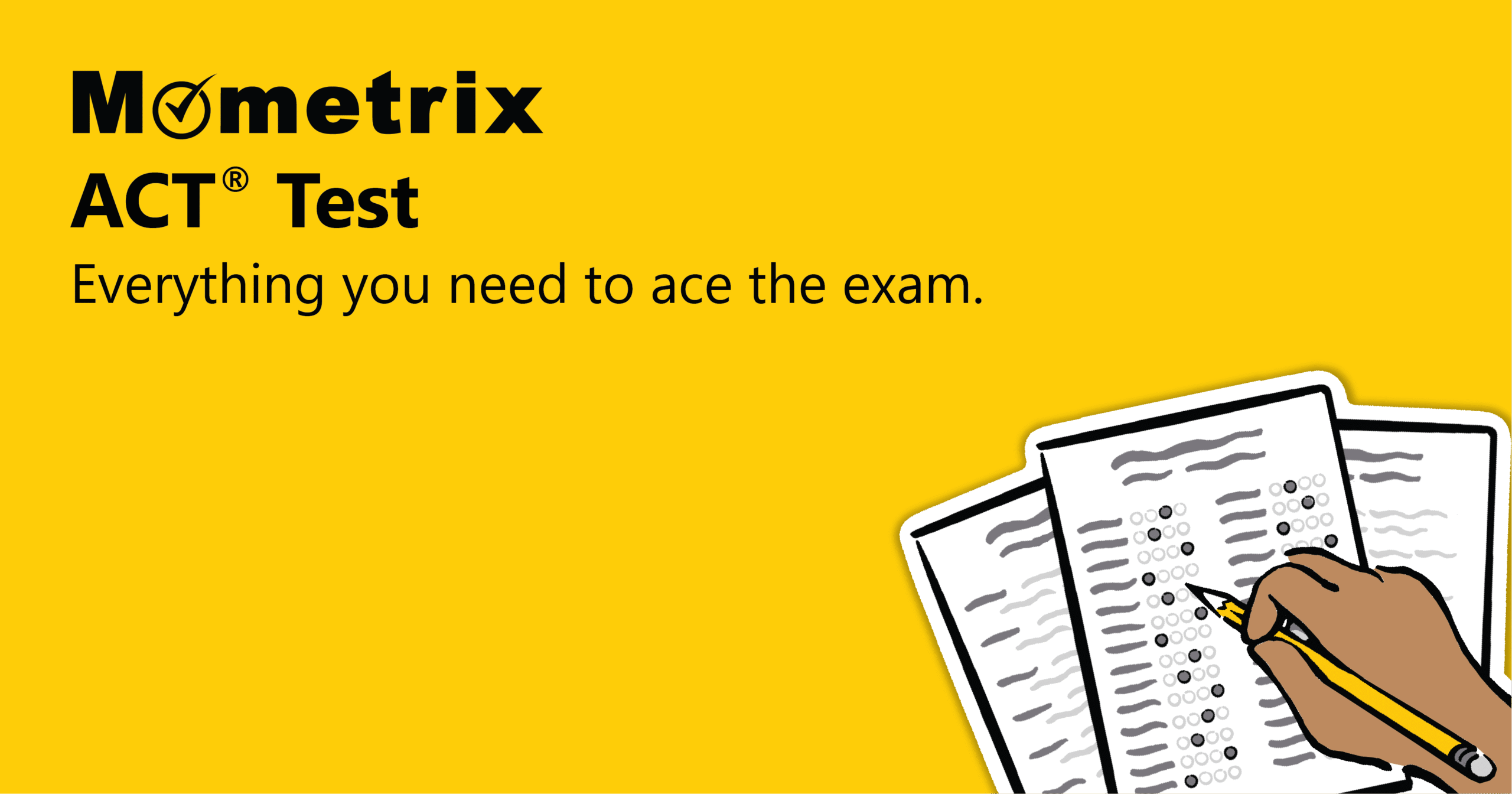Planning to enroll in college? You may need to take the ACT as part of the admissions process!
For those new to the test, this page provides everything you need to know about its content, scoring, and overall importance.
If you’re already familiar with the test, and you’re looking for ACT test prep help, you’re also in the right place! Just below, you’ll find links to a wide variety of free review videos and practice questions that can help you get a great score on the ACT.
What is the ACT?
The ACT is one of the two major college admissions tests used by colleges and universities in the US. The name used to be an abbreviation for “American College Testing,” but now ACT is the official name. It was first used in 1959, and since that time its use by colleges has grown tremendously, with over 1.4 million students taking the test in 2024.
The ACT exam does two things: it measures how much knowledge a person has in English, math, reading, and science, and it also measures how likely the test taker is to be successful in studying these four areas at the college level.
ACT Test Outline
The test is split into five sections and is timed at 2-3 hours. The Writing and Science sections are always optional.
1. English
The questions in this section are split into three categories:
The questions in this category assess your knowledge of topic development, organization, unity, and cohesion when it comes to a piece of writing.
Knowledge of Language
The questions in this category assess your ability to use precision and concision in word choice to demonstrate effective language use, as well as your ability to maintain consistency in the tone and style of a piece of writing.
Conventions of Standard English
The questions in this category assess your ability to revise and edit a piece of writing using standard grammar, mechanics, and language usage conventions.
You will be given five different passages to read, usually consisting of several paragraphs. The passages will vary greatly in both style and topics and are usually unrelated to any other passage. After each passage, you’ll be given several questions (an average of 15 for each passage) to answer concerning what you just read. Some parts of the passage will be underlined, and different parts of the passage will be assigned a number for easy reference when answering questions.
Many of the questions will be about one of the underlined portions of the passage. You will be shown several substitutes for the underlined portion and asked which one should replace it. In some questions, you have the option of selecting NO CHANGE if you believe the underlined text is correct as written. Other questions may concern the entire passage, or particular sections of the passage, even though they’re not underlined.
2. Mathematics
The questions in this section are split into two categories:
The questions in this category assess your knowledge of recently learned math concepts, from algebra to statistics. This category is divided into further subcategories:
- Number and Quantity
- Algebra
- Functions
- Geometry
- Statistics and Probability
Integrating Essential Skills
The questions in this category assess your ability to solve complex problems by synthesizing and applying various concepts.
According to ACT, you don’t need to memorize any complex formulas to do well on the Math section, nor will you be required to perform any long, intensive calculations. In fact, ACT says that a calculator isn’t required to solve any of the math problems (though you are welcome to use an approved calculator if you wish).
3. Reading
The questions in this section are split into three categories:
The questions in this category assess your ability to identify main ideas and themes in a text, draw logical inferences and conclusions from a text, summarize information and ideas from a text, and understand various types of relationships presented in a text (sequential, cause-and-effect, etc.).
Craft and Structure
The questions in this category assess your ability to analyze text structure, define words and phrases, analyze characters’ points of view, understand a passage’s purpose, and rhetorically an author’s word choice.
Integration of Knowledge and Ideas
The questions in this category assess your ability to distinguish facts from opinions, understand and evaluate an author’s claims, and make logical connections between related texts.
The reading material will be divided into four categories: Social Studies, Natural Sciences, Humanities, and Literary Narrative or Prose Fiction. In other words, you’ll have a passage (or two short passages) from each of the first three categories named, and one category will be either Literary Narrative or Prose Fiction. All of these categories are wide-ranging, so there’s no way to predict exactly what the subject matter in each category will be.
4. Science
The questions in this section are split into three categories:
The questions in this category assess your ability to analyze and manipulate scientific data found in charts, tables, graphs, and diagrams.
Scientific Investigation
The questions in this category assess your knowledge of experimental tools and procedures and your ability to compare and modify experiments.
Evaluation of Models, Inferences, and Experimental Results
The questions in this category assess your ability to validate information and establish conclusions and predictions based on that information.
The Science section is focused on the natural sciences, and it assumes that you have completed (or are close to completing) three years of high school science classes, including one in biology and one in either a physical science or an Earth science.
5. Writing
Some colleges and universities require applicants to take the optional ACT Writing test. Many people register for and take the Writing test even though their intended schools don’t require it, just in case they later change their mind and apply to one or more schools that do require it.
If you choose to take the optional Writing test, you will be given 40 minutes to write an essay that outlines your perspective on an issue presented in a given writing prompt. Your score on this test is calculated separately from the other parts of the ACT, so it does not negatively affect your overall ACT score if you perform poorly.
Here is the list of possible ACT Writing scores, the level of skills each one represents, and factors that go into determining the score:
1. Few or no skills
2. Weak skills
3. Skills in development
4. Adequate skills
5. Competent skills
6. Effective skills
Check Out Mometrix's ACT Study Guide
Get practice questions, video tutorials, and detailed study lessons
Get Your Study Guide
Registration
There are three ways to register for the ACT.
The most common method, and the best, is to register online at the official ACT website. Once you’re on the website, just follow the instructions. The process begins with creating an account. When creating your account, make sure to enter your first and last names exactly as they appear on the photo ID you’ll need to show on the day of the test. You’ll want to do this well ahead of the registration deadlines.
The second method is registration by mail. This isn’t the best choice, as it takes much longer and the possibility of correspondence getting lost or delayed always exists.
The last method is by far the worst option, and that’s registering as a standby. In other words, if you missed the registration deadlines, standby registration allows you to have a slim chance to show up on the day of the exam and be allowed to take the test. If you’re in this situation, and standby registration is your only option, you’ll need to go to the ACT website and sign up for standby registration. However, you should do all you can to avoid standby registration, as there’s a very good chance you won’t be admitted to take the ACT.
Test Dates
The ACT is given nationwide at thousands of locations, six times a year: February, April, June, September, October, and December. Most locations are a public school or a local college or university. The test date always falls on a Saturday, but for students with religious convictions against testing on Saturday, other arrangements can be made.
Test Day
You must report to your assigned testing site by the time that is noted on your admission ticket, which you should bring with you. A late arrival will result in your test being canceled.
What to Bring
Along with your admission ticket, you should also bring an acceptable form of photo ID and at least one sharpened No. 2 pencil. You are also allowed to bring snacks, a watch to keep track of time limits, and a calculator.
You are not allowed to bring any books, study materials, notes, scratch paper, highlighters, white-out, or colored pencils/pens. If you do bring any of these, you will be asked to leave them outside of the testing room.
Taking the Test
Before the test begins, you will be assigned a seat and given specific test-taking directions and information. Once all of the rules and information has been presented, the test will begin.
A break will be scheduled after the second test, during which you can relax but cannot use your cell phone or any other electronic devices.
Once the full test is over, you will be dismissed.
Average ACT Scores
Every person who takes the ACT receives multiple scores. There is the composite score, which is what most people mean when they talk about their ACT score. Then, there are the four individual test scores (English, Math, Reading, and Science). Each of these four scores can range from 1-36. The four scores are then added together, and the average becomes the composite score, which also will be a number from 1-36.
There are also seven ACT subscores, with each subscore ranging from 1 to 18. The two in English are Usage/Mechanics and Rhetorical Skills. The three Math subscores are Pre-Algebra/Elementary Algebra, Intermediate Algebra/Coordinate Geometry, and Plane Geometry/Trigonometry. The two Reading subscores are Social Studies/Natural Sciences and Arts/Literature. The Science section has no subscores.
The most important score is the composite score. This is the main number colleges and universities are concerned about when it comes to ACT scores. The individual test scores also matter, as they show your strengths and weaknesses. The subscores reveal even more detailed information along these lines. However, it’s the composite score that dominates all the others.
It’s easy to find the average ACT score of students at colleges and universities you’re considering. Many schools publish this information right on their website.
When Do ACT Scores Come Out?
Release dates can differ depending on the section. Multiple choice scores are available about two weeks after your test date, while writing scores are about two weeks after the multiple choice scores are released. For those who took the writing exam, their overall scores are not reported until the scores from the writing exam have been added. One exception to this is when ACT holds equating activities. What this means is they go through and ensure that the scores being reposted have a consistent meaning across all test forms. During times that the ACT holds these activities, scores are available within 3-8 weeks.
Retaking the Test
If you would like, you are able to take the ACT again to try for a higher score. You get to choose which set of scores are sent to schools, and you can even combine scores from different test dates to create a new composite score.
ACT vs. SAT vs. PSAT
The ACT, SAT, and PSAT are each used to help you get into college, but there are some notable differences among them. Wondering which test is right for you?
Take a look at the details of each exam here:
| Time | ||
|---|---|---|
| ACT | SAT | PSAT |
| 3 hours (estimated) | 2 hours and 45 minutes (+50 minutes for Essay section) | 2 hours and 45 minutes |
| Question Count | ||
|---|---|---|
| ACT | SAT | PSAT |
| 171 (multiple-choice questions) | 98 (mostly multiple-choice questions) | 139 questions (estimated) |
| Section Count | ||
|---|---|---|
| ACT | SAT | PSAT |
| 3 sections (+2 optional sections) | 2 sections | 3 sections |
| Subjects | ||
|---|---|---|
| ACT | SAT | PSAT |
|
|
|
| Test Dates | ||
|---|---|---|
| ACT | SAT | PSAT |
| Dates set by the College Board | Annually in October |
| Registration Methods | ||
|---|---|---|
| ACT | SAT | PSAT |
| Online and by mail | Online | Registration handled by the school |
| Fee | ||
|---|---|---|
| ACT | SAT | PSAT |
| $68 (+$25 for writing, +$4 for science) | $68 | $18 (varies based on school or state funding) |
| Fee Waiver | ||
|---|---|---|
| ACT | SAT | PSAT |
| Yes | Subject to region | Yes (for eligible low-income students) |
| Receive Scores | ||
|---|---|---|
| ACT | SAT | PSAT |
| 3-8 weeks | 2-4 weeks | 50 days (estimated) |
| Pass or Fail | ||
|---|---|---|
| ACT | SAT | PSAT |
| No | No | Yes |
| Time | ||
|---|---|---|
| ACT | SAT | PSAT |
| 3 hours (estimated) | 2 hours and 45 minutes (+50 minutes for Essay section) | 2 hours and 45 minutes |
| Question Count | ||
|---|---|---|
| ACT | SAT | PSAT |
| 215 (multiple-choice questions) | 98 (mostly multiple-choice questions) | 139 questions (estimated) |
| Section Count | ||
|---|---|---|
| ACT | SAT | PSAT |
| 4 sections (+1 optional section) | 2 sections | 3 sections |
| Subjects | ||
|---|---|---|
| ACT | SAT | PSAT |
|
|
|
| Test Dates | ||
|---|---|---|
| ACT | SAT | PSAT |
| Dates set by the College Board | Annually in October |
| Registration Methods | ||
|---|---|---|
| ACT | SAT | PSAT |
| Online and by mail | Online | Registration handled by the school |
| Fee | ||
|---|---|---|
| ACT | SAT | PSAT |
| $69: without writing section $94: with writing section | $60 | $18 (varies based on school or state funding) |
| Fee Waiver | ||
|---|---|---|
| ACT | SAT | PSAT |
| Yes | Subject to region | Yes (for eligible low-income students) |
| Receive Scores | ||
|---|---|---|
| ACT | SAT | PSAT |
| 3-8 weeks | 2-4 weeks | 50 days (estimated) |
| Pass or Fail | ||
|---|---|---|
| ACT | SAT | PSAT |
| No | No | Yes |
Check Out Mometrix's ACT Flashcards
Get complex ACT subjects broken down into easily understandable concepts
Get Your Flashcards
ACT Online Prep Course
If you want to be fully prepared, Mometrix offers an online ACT prep course designed to give you everything you need to succeed!
Here’s what you’ll find in the ACT course:
Everyone learns differently, so we’ve tailored the ACT online prep course to ensure every learner has what they need to prepare for the ACT exam.
Click below to check it out!
FAQs
Q
What is a good ACT score?
A
A good ACT score is any score over 20.
Q
How long is the ACT?
A
The full ACT is timed at about 3 hours.
Q
What is the highest ACT score?
A
The highest score on the ACT is 36.
Q
How many questions are on the ACT?
A
The online ACT contains 171 questions, and the paper-and-pencil version contains 215 questions.
ACT® is a registered trademark belonging to ACT Education Corp. (“ACT”). ACT is not involved with or affiliated with Mometrix Media LLC, nor does ACT endorse or sponsor any of the products or services offered by Mometrix Media LLC.






